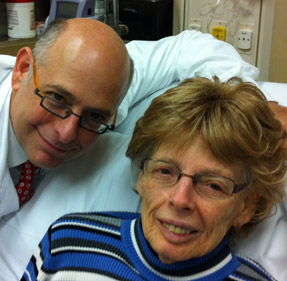Yiddish for hospitalists
After our Latin primer for hospitalists, it only seems right to explore another language that's likely to be of great help.
Following our Latin primer for hospitalists in the October 2012 ACP Hospitalist, it only seems right to explore another language which is likely to be of great help to hospitalists.
That language is Yiddish, a 10th-century, Ashkenazi-flavored stew of German, with Aramaic, Hebrew, Slavic and Romance linguistic seasoning. Many Yiddish words are part of the English lexicon, including schmooze, klutz, blitz and bagel.

Here are a few more that may help you on rounds. Spelling and meanings change over time, languages evolve, but some concepts are timeless. If you don't agree with our definitions or usage, be a mensch and don't kvetch about it.
SCHLEP: “A long and tedious journey.” When our hospital gets crowded, our unit-based patient assignments break down. Next thing you know, patients are on wards all over the hospital. Now we have to schlep back and forth to see them all.
SCHLUB: “Unkempt or messy without thought. Opposite of metrosexual.” Our applicant showed up for his interview with his shirt untucked, his suit wrinkled and wearing grungy old sneakers. It might be resident chic, but he was too much of a schlub to make a good first impression.
NOODGE: Verb, “to bother or annoy.” Noun, “a person who pesters.” It was a busy day with five admissions already when the case manager called me for the fourth time. She wanted me to improve my documentation—encephalopathy, not altered mental status. The woman may be correct, but she is still a total noodge.
NUDNIK: “An obtuse, boring or bothersome person.” The hospitalist was trying to get his work done when the medical student began to ask questions: Can you explain renal tubular acidosis? How do you order an ECG? Why do birds suddenly appear? What a nudnik.
KVETCH: Verb, “to whine or complain.” Noun, “a chronic complainer.” The call schedule came out and of course Dr. Q immediately started kvetching about his number of nights on call. What's new?
MEGILLAH: “A long, tedious, detail-filled story.” It was the first day of internship and the newly minted doctor began her presentation to the team. All we wanted was a brief synopsis but she droned on and on, reciting the patient's entire life history, childhood diseases and astrologic sign. It was an eight-page history and she read the whole megillah out loud.
KIBITZ: “To give unwanted advice.” The resident was trying to teach the interns, but the attending kept interrupting with comments and advice. The resident wished he could move on without so much kibitzing.
MESHUGGENEH: Noun or adjective, “crazy.” Observation or inpatient? ICD-9 or -10? I would really like to be able to take care of patients without all these meshuggeneh rules.
BUBKES: Literally, “goat feces.” Figuratively, “nothing of worth.” You are negotiating a contract with an insurance executive. Things are stalled; the final offer gives you bubkes. Might be time to get a lawyer.
SCHLEMIEL AND SCHLIMAZEL: “A habitual bungler” and “an extremely unlucky person,” respectively. The schlemiel spills the soup and the schlimazel gets it poured in his lap.
It was destined to be a bad night for the team. Dr. W was in the emergency department and Dr. C was the hospitalist on call. When we came in that morning there had been 12 admissions, none of which were appropriate for the service. Two went to the ICU, three to surgery, and one even to obstetrics! The rest were discharged. That's what happens when a schlemiel is admitting to a schlimazel!
MENSCH: Literally “a man.” Figuratively, “a person who should be respected, who does a great job.” The physician assistant's shift was nearly over when we got the call that there were two admissions that had just hit the floor. We tag-teamed them; I did the history and physical and notes, while he wrote the orders. And he still got done on time. What a mensch.
SCHNORER: “A habitual borrower or freeloader.” The nurse practitioner sat at her cubicle trying to get some work done. First the doctor asked to borrow a pen, then her stethoscope, then a dollar for a soda. That Newman is such a schnorer.
OY VEY IZ MIR: “Oh woe is me.” The mother and son sat down to write a column. They picked a bunch of phrases and concocted this mishmash. Oy vey iz mir!



